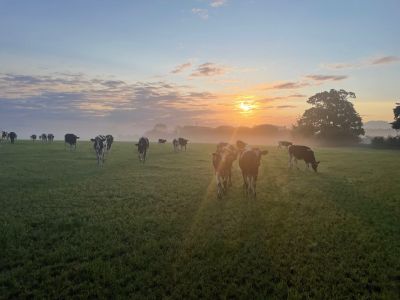
Posted By:
As we embrace the autumn calving season, our focus at Shepton Vets remains steadfast on ensuring the well-being and productivity of your herd. The calving and transition period demands meticulous attention, but forward-thinking is equally vital. It's at this juncture that we should already contemplate strategies to secure a robust calving block for the upcoming year. In the article below, we've compiled essential tips to pave the way for a successful service season and a seamless calving block.
We are well into the swing of Autumn calving now and although focus is very much on calving and transition, it is important to already start considering what can be done at this stage to ensure that next year’s block is as tight as possible. Below are my top tips for ensuring a good service season and subsequent calving block:
Get transition right:
There is still very good grass growth, but this is not likely to make good transition cow feed. If calving outside, look to limit the amount of grazing grass available. Whether calving outside or inside provide a palatable, energy balanced, low potassium, rumen-filling ration to your dry cows. Getting transition right will reduce ketosis and milk fever issues, which both have significant contributions to fertility.
Record any problems:
Make note of any cows that have had problems around calving; milk fever, twins, intervention at calving, RFM – ALL these animals should see a vet for a post-natal check 21 days after calving, or sooner if not performing well.
Gather additional information:
Ketone testing is an invaluable tool to head off negative energy balance problems before they become major issues; a blood or milk ketone test can be performed 2-21 days post calving (ideally 2-14 days). Short-term treatment plans can be put in place for ketotic cows and longer-term plans can be made if the herd-level ketosis level looks too high.
Present cows for post-natal checks:
Ideally all cows (but at least the problem cows discussed above) should be seen by your vet for a post-natal check, this allows endometritis “whites” to be detected early and treated. Looking for discharge from cows to decide who sees the vet will mean a lot of cows with endometritis are missed, most cases require a vaginal examination or scanning using ultrasound to be detected.
Present cows for pre-breeding checks:
Problem cows should be presented again to your vet prior to breeding, to check that treatments have been successful and to make sure other associated problems (such as cysts) have not followed. Pre-breeding heats should be monitored for at least 3 weeks prior to breeding and any cows without a reference heat or having erratic heats should be presented to your vet for treatment, to ensure they are served within the first cycle of your block.
Get the “other” things right:
There’s a long list of things that can affect fertility and they’re often farm specific. Some examples we have recently seen are Salmonella, BVD and IBR outbreaks, trace element under and over supply, and semen/AI issues all causing issues affecting fertility.
Discuss with us about your farm’s specific situation is best advised to ensure none of these “other” items slip through the net.
- Vet Charlie
The path to a thriving herd and a productive calving season begins with strategic planning and diligent care. At Shepton Vets, we understand the nuances of each farm's unique situation and stand ready to assist in overcoming any challenges that may arise. Whether it's optimizing transition management, addressing post-natal concerns, conducting pre-breeding checks, or tackling unforeseen factors affecting fertility, our team is your dedicated partner in ensuring the health and success of your herd. Together, we aim for a future of thriving livestock and prosperous farming.
Whilst on my visits I have been having several discussions...
As our feline friends get older there are a few conditions...
Another winter discussion group season is now behind...
©2024 Shepton Veterinary Group Ltd., All rights reserved.
Privacy Policy • Terms & Conditions • Cookie Policy